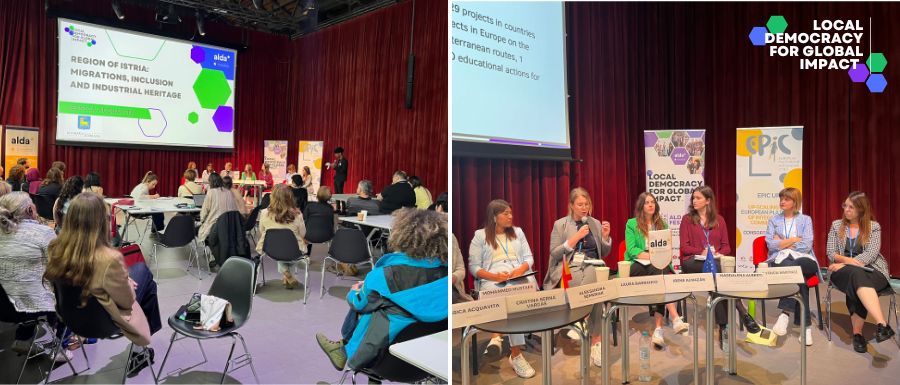As part of its General Assembly and Festival 2024, on May 14 ALDA hosted a dynamic workshop titled “Integrated Cities for Migrant Inclusion: Multi-Sectoral Collaboration.” This event focused on how collaboration across diverse sectors can facilitate the inclusion and integration of migrants at the local level. Bringing together various stakeholders, the workshop discussed practical strategies and shared insights on creating inclusive environments for migrants, influencing international policy-making through local actions.
The workshop commenced by highlighting the importance of engaging various sectors to involve migrants within the EU and beyond
Emphasising training and capacity building for local authorities, NGOs, and institutions, the session spotlighted social experimentation as an innovative method to address social needs and bridge the gap between research, policy-making, and practical implementation in migration and social justice. The core theme revolved around how collaborative efforts involving local authorities, NGOs, and community organisations can create a supportive environment for migrants.
Presentations by EPIC-UP project leaders underscored the sectors of intervention within EPIC-UP and how coordination with different sectors ensures migrant participation and inclusion at the local level. Key speakers included:
Mrs. Patricia Martínez with AEIDL, ss the WP6 Leader of the EPIC-UP Project, AEIDL presented lessons learned from previous projects and outlined upcoming work on Migration Narratives. They emphasised the need to change the narrative on migration in the age of polarisation and disinformation, highlighting the importance of effective dissemination, exploitation, communication, and outreach strategies.
Mrs. Laura Barranco and Mrs. Irene Almazán from Fundación Cepaim discussed social experimentation as a policy intervention that provides innovative responses to social needs. They explored effective methods and models to ensure targeted Communities of Practice (CoPs) and Local Authorities (LAs) achieve tangible and systematic changes in integrating migrant populations at the local level.
Mrs. Maddalena Alberti from ADL Zavidovici presented on capacity building, focusing on effective methods and models for integration capacity building and training for Local Authorities (LAs), Civil Society Organizations (CSOs), and institutions working in migration inclusion. They also discussed the role of peer-mentoring sessions in facilitating knowledge sharing and ensuring successful integration.
Following the presentations by EPIC-UP leaders, the workshop featured insights from cities and regions that have adopted similar coordination efforts, sharing their experiences and lessons learned:
Mrs. Aleksandra Semeriak representing Fons Catala De Cooperacio Al Desenvolupament, highlighted legal support and systemised legal channels for migrants. The “Refuge Local World” Campaign addresses the immediate needs of refugees, forcibly displaced individuals, and stateless populations at the local level, contributing to the establishment of safe and legal pathways for individuals in need of international protection within the city.
Mrs. Cristina Serna Vargas from the Municipality of Sant Boi de Llobregat (Spain) shared their comprehensive strategy for local reception based on their experiences. They discussed the importance of a holistic approach in ensuring effective and sustainable migrant integration.
Also, Mrs. Jessica Acquavita with Region Istria (Croatia) presented their approach to addressing migration challenges through initiatives focused on social cohesion and inclusion. They highlighted various successful initiatives supporting migrant integration and promoting cultural diversity, showcasing the region’s commitment to creating inclusive environments.
The workshop concluded with a consensus on the critical role of multi-sectoral collaboration in addressing migration challenges and promoting migrant inclusion. The diverse strategies and successful initiatives discussed underscored the importance of coordinated actions across various sectors. This collaborative approach aims to create supportive environments for migrants, ensuring their rights and facilitating their active participation in the community.
ALDA’s workshop on multi-sectoral collaboration for migrant inclusion provided a comprehensive platform for sharing innovative approaches and practical solutions. The insights and experiences shared during the session offer valuable guidance for future initiatives, promoting a more inclusive and cohesive society.
